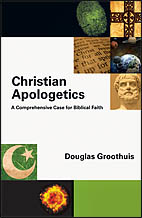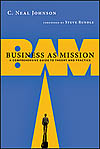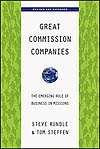
As Douglas Groothuis‘ newly released 752 page casebound Christian Apologetics: A Comprehensive Case for the Biblical Faith (IVP. 2011) spilled out of the box onto the counter in front of my four girls, I felt the press of two book reviews, a stack of material to read for three seminary classes, and various responsibilities at home, church and work. How did I respond?
Thankfully, earlier in the day I had read Hannah’s ESN blog post What I Wish I’d Known About Graduate School: Surviving the Workload (8/23/2011), in which she writes:
I found it depressing to realize this, but graduate school in the humanities is probably going to entail some skimming. It’s crucial to decide on a few central priorities for a semester and focus on them. It’s still important to work hard in courses that aren’t central to your interests, but you probably will have to skim some readings.
AND Kevin’s ESN FB Wall comment/recommendation, “There is a great book by Mortimer Adler called ‘How to Read a Book‘– it provides guidance for both effective skimming and deep reading. All grad students should read it BEFORE starting grad school.” Note: Google Books preview available here.
Yes, deep down, I feel an uneasiness about not picking up a good book when it sits in front of me AND furthermore, the pangs of guilt when intentionally skimming a good book. As time, energy, finances, blog attention spans are limited, “Why should I (and you) bother with Groothuis‘ Christian Apologetics (IVP. 2011)?”


With regard to my own use of resources, I came to the conclusion that it is the same reason I gave time, energy, and finances to
- C. Neal Johnson‘s 528 page Business as Mission (IVP. 2009)
- Steve Rundle and Tom Steffen‘s 240 page Great Commission Companies (IVP. Revised. 2011)
AND placed them in my library.
Familiarizing myself with the overall purpose/structure of these book and their most important content, prepares me to encourage and equip others as they seek to be/follow Christ in the marketplace (including the marketplace of ideas, i.e., the campus). To have these resources “on hand,” enables me to pass them along to others who will benefit from exploring (and possibly discussing) the resources more deeply.
Maybe Adler would say, it’s a significant opportunity to gradually lift yourself [and others] from a state of less understanding to understanding more (8). I find his term inspectional reading combined the quote by Sir. Francis Bacon, an encouragement not to slip into an analytical reader only perspective 😉
Some books are to be tasted, others to be swallowed, and some few to be chewed and digested: that is, some books are to be read only in parts, others to be read, but not curiously, and some few to be read wholly, and with diligence and attention. — Sir. Francis Bacon
Last week, after several months on my shelf, I passed along Business as Mission and Great Commission Companies to a graduate student considering opportunities in “closed countries.” My inspectional reading of these books, enabled me to affirm their specific helpfulness to address longings placed in the heart of this child of God. If the resources prove of value for the long term, the graduate student may keep them. If Business as Mission and Great Commission Companies serve only in the short term, they come back into my library to share with others.
With a similar perspective, I began an inspectional reading of Christian Apologetics, put it down, and wrote this blog post. To whet your appetite, below’s some material from Chapter 2: The Biblical Basis for Apologetics:
. . . it seems many Christians deem apologetics unnecessary at best and harmful at worst. Some claim that the ways of God are incorrigibly mysterious and beyond figuring out, thus leaving no place for rational argumentation for Christian truth. “You cannot argue anyone into the kingdom,” it is often said. Yes, an infinitely wise God has a myriad of ways of getting our attention and revealing his saving truth. But the biblical evidence, as we will see, indicates that arguments in favor of Christianity are one way by which God reaches those in need of God’s provision. The claim that no one is argued into Christianity is simply false. Although reasoning with unbelievers can prove frustrating, this may be more the fault of poor arguments, poor presentations or poor character than of the fruitlessness of apologetics per se. . . . (29)
Here is the sum of the matter. We must earnestly endeavor to know the truth of the biblical worldview to make it known with integrity to as many people as possible with the best arguments available to others in the most compelling form available. To know God in Christ means that we desire to make Christian truth available to others in the most compelling form possible. To be created in God’s rational, moral and relational image means that our entire being should be aimed at the glorification of God in Christian witness. A significant part of that witness is Christian apologetics (44).
Hmm . . . I think the same graduate student mentioned above and the whole campus fellowship would be blessed by this resource as they interact with students from across the world in their labs, classes, halls, living quarters, and campus activities. But how would it be best to share the material from the 752 page volume in a manner which equips for the short and the long term?
Hannah’s post also draws attention to weaving insights into a variety of opportunities, which is what I’ve done with Business as Mission, Great Commission Companies, and number of other books. Immediately several ideas came to mind:
- introductions for speakers (marketplace and international missionaries)
- a spring break missions trainer
- conversations about (and in) campus witness: what I find many times is a mix of analysis, discovery, imaginative storytelling, reflection, and training
- loaning to those with greater interest for reading over breaks
- blog posts 🙂
Beyond the campus, Christian Apologetics serves as a reference for seminary classes, teaching Sunday School, and my own personal equipping.
Unless you are a graduate student in philosophy or theology OR one with a great passion for apologetics at this time, I don’t recommend picking up and reading straight through Groothuis‘ magnum opus. None-the-less, Christian Apologetics is a valuable asset which I think should be accessible to students in every GFM chapter across the country AND that’s why one finds the title on the Campus Resources from IVP: Compiled for Graduate & Faculty Ministry.
Thank-you to Nick Liao (Academic Sales and Marketing Manager for InterVarsity Press) for the recommendation, Douglas Groothuis for the writing, and InterVarsity Press for the publishing. What a joy to partner together in the work of the Gospel!
I encourage you to
- take a peek at Christian Apologetics via Google preview — begin by trolling through the Table of Contents.
- post what you think are the most significant pros/cons regarding the practice of Christian apologetics.
- post what questions regarding the faith most require attention on campus as we seek to humbly invite/call others to consider the Way, the Truth, and Life found in Christ alone.
- Swing by Why “Christian Apologetics”? —Hell, where I focus on a particular topic from Christian Apologetics.
Updated 11/2/2011. 10:46 AM.
Tom enjoys daily conversations regarding living out the Biblical Story with his wife Theresa and their four girls, around the block, at Elizabethtown Brethren in Christ Church (where he teaches adult electives and co-leads a small group), among healthcare professionals as the Northeast Regional Director for the Christian Medical & Dental Associations (CMDA), and in higher ed as a volunteer with the Emerging Scholars Network (ESN). For a number of years, the Christian Medical Society / CMDA at Penn State College of Medicine was the hub of his ministry with CMDA. Note: Tom served with InterVarsity Christian Fellowship / USA for 20+ years, including 6+ years as the Associate Director of ESN. He has written for the ESN blog from its launch in August 2008. He has studied Biology (B.S.), Higher Education (M.A.), Spiritual Direction (Certificate), Spiritual Formation (M.A.R.), Ministry to Emerging Generations (D.Min.). To God be the glory!

Not specifically on the subject of inspectional reading,I noticed something else in the blog post I think is worth raising. Tom wroe that “My inspectional reading of these books, enabled me to affirm their specific helpfulness to address longings placed in the heart of this child of God.” This is certainly a reason to become acquainted with many books, perhaps more than just acquainted in some cases. I am wondering more about speaking to the longings of the heart of a believer. Let me say right here that I’m not saying anything or implying anything about this specific situation, Tom Grosh IV or the unnamed graduate student. I think, though, that I would want to also point a student to something to help him or her assess whether those longings should be pursued. I can’t even decide for myself if certain longings of my own that won’t go away are put there by God or my own imagination. So I would like to be able to say to a student, “Read this about the desire you have and read this in order to assess the desire.” Even though I am only an adjunct I get asked by students about their longings and it often difficult to know how to respond. Suggestions?
Thank-you, Ken. You bring up a good point.
I don’t want to give the impression that I’m encouraging students to “run with” any desire that swells up in their hearts. In the particular, in the situation mentioned above I have been talking and “counseling” this grad student over many months as he seeks discernment regarding next steps both in following Christ as a student and in life after graduation as part of the people/Kingdom of God. At a given time, such conversations (1-1 and in small group contexts) involve varying elements of prayer, the Word of God/Scripture, vocational possibilities, accountability as a member of a “witnessing community,” various webposts/articles/books/audios, “hands on ministry”/service, identifying possible mentors beyond the campus (some which occur through media sources), and campus/community relationships. He demonstrates a gentle, joy-filled gifting and passion for internationals (not just students in his specialty), bearing the fruits of the Spirit in head, heart, and hands — some of which I ardently pray for and rejoice in the opportunity to see modeled for my instruction/encouragement. To God be the glory!
Yes, as a general rule, it is difficult to assess the sincerity of desires as they pertain to life choices. Care must be taken when providing counsel to students, scholars, significant others, prospective students, etc. An excellent topic for a future blogpost AND related to the significant attention given to Dennis Hollinger’s (President of Gordon-Conwell Theological Seminary) call for a balance of loving God with “Head, Heart, and Hands,” https://blog.emergingscholars.org/?s=head+heart+hands+hollinger. As you’ll note with the series, I have found this a significant book in framing conversation not only on campus, but in life in general.
Which brings to mind, are you familiar with the work of Gordon T. Smith, http://www.gordontsmith.com/, president of reSource Leadership International (an agency that fosters excellence in theological education in the developing world)? You may find his materials on calling and listening to God helpful, see http://www.ivpress.com/cgi-ivpress/author.pl/author_id=744. He has some audio files posted at http://www.gordontsmith.com/Audio%20Downloads. In addition, InterVarsity’s alumni website has an excerpt from “Courage and Calling” (which we list on “Campus Resources from InterVarsity Press: Compiled for Graduate & Faculty Ministry, http://www.intervarsity.org/gfm/download.php?id=9367&version_id=12882) posted at http://www.intervarsity.org/alumni/resource_item.php?id=7322.
In the excerpt, Smith briefly surveys GOD HAS CALLED YOU, A Theology of Work, A Theology of Vocation, and The Longing to Make a Difference.
More directly addressing your question is a Christianity Today interview posted at http://www.christianitytoday.com/ct/2003/novemberweb-only/11-17-24.0.html (Accessed 8/28/2011. 2:35 pm). The question/response begins with the below piece and goes deeper.
Question: “You say there are two questions that every Christian should be able to answer: what is Jesus saying at this point in your life? And how do you know it is Jesus? What does it mean to be able to “discern” the voice of Jesus?”
Smith’s Response: “The context in which we are attentive to the voice of Jesus is what’s happening to us personally. And when I say that I mean emotionally. That is, the emotional contours of our lives become the soil in which we discern, sift, or determine what is truly from God and what is not. Discernment is all about attending to what’s happening to us emotionally in a way that’s informed by the mind, by the breadth and witness of the Scriptures, and by the counsel of other Christians. But it’s really testing our own hearts to see if this comes from God.
The more I read the Scriptures the more I realized how central the emotional life of Jesus was to him for the joy that was set before him, but especially when I read the Psalms. And then when I came to Paul’s writings, “the deep longing for a peace that transcends all understanding.” “Your joy would be complete.” And I kept coming up against these texts in Scripture and realizing that the emotional life is far more central to the spiritual life than I’d realized.”
Please forgive me for what has most probably become a ramble. Feel free to shoot back a question or two. Thank-you for the inspiration for some future posts, maybe I’ll work some of the material into a follow-up posts on “Christian Apologetics” followed by “Finding Calcutta: What Mother Teresa Taught Me About Meaningful Work and Service” (Mary Poplin. InterVarsity Press. 2008. http://www.ivpress.com/cgi-ivpress/book.pl/code=3472). . . .
I know this isn’t particularly original, but over the long haul, I’ve found Augustine’s Confessions and much of C. S. Lewis’s work to be incredibly helpful in thinking through the value and right ordering of longings. Neither is offering the sort of practical checklist that many people find helpful. But both are engaging at a deep level the goodness of desire in a Christian context, the belief that God has given us a longing for Him and for His callings that is inherently good, however it might be obscured by our sins. And I’ve found both Augustine and CSL helpful in sorting through the right ordering of different desires within the overarching desire to pursue God. I think much of the collection Weight of Glory is dealing with this theme in some way, as is The Great Divorce.
However, those might not be the most practical book suggestions if one is advising people on career goals, etc. Maybe there are other books out there that negotiate similar spaces with a more specific interest in choosing careers, deciding where to live, etc.?
Thanks for that response, Tom. That looks like a helpful set of resources. Recently, I had a student in an online M.Div. course I was teaching contact me. She had to drop out of seminary and couldn’t figure out what to do because she is convinced that God called her to be a pastor and her circumstances have really blocked that in many ways. I thought to myself, “She should have asked a full-time professor.” I also noted the irony of the situation, since the main things I could tell her were about my own belief for many years that God had called me to something specific that never happened no matter what I did. So I’m glad that there are wiser folks out there I can point her to.
Again, as I tried to say in my first post, I was not trying to second-guess what was going on with the graduate student you mentioned. I really was not trying to critique that obliquely. As I said, I can’t even figure out what my longings in spiritual matters mean, so I’m hardly in a position to say anything to anyone else. That’s why I raised the question. Thanks for the substantive response.
Ken
Thanks for the discourse Ken. We appreciate the feedback. We really do. Looking forward to further conversation on this important topic and others.